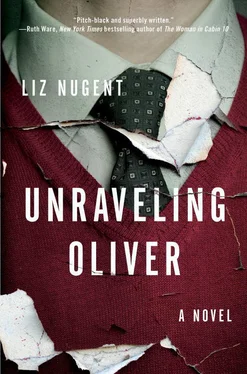Laura was enormously helpful to me, although it took me time to realize it. At first, it irked me that she would insist on saying prayers for me and with me, lighting candles and blessing herself as she passed the ruin of the east wing. As if any God would allow a child and a war hero to burn to death, but gradually I began to see that there was some comfort in the ritual and that it kept the darkness at bay. Laura’s faith assured her that there was a purpose, a reason, and that, while it may never be revealed to us, it was for the ultimate good of mankind. To this day, I cannot say that I subscribe to such a theory.
Laura asked permission to move into the house, as the residential workers were mostly gone by November and the bunkhouses were not suitable for the winter. My rule about the house being only for family made no sense now that there was no family. Over the winter months we slowly became friends and confidants, Laura and I, as she nursed me, fed me, cared for me. How shocked she was when I told her about Jean-Luc’s paternity, and utterly aghast that my father had encouraged it. She had assumed I was a widow and insisted that being a single mother would never be acceptable in Ireland, that in her country, it was a shameful thing. It was the same in France, I told her, only I had an exceptional father. She insisted that it was not too late for me to fall in love, to marry, to have other children. I was just thirty-nine then, twice her age, but I was sure that I did not want love. It was not worth the risk of losing it. She nodded sagely but did not dare to compare her loss of Oliver to my loss, although I knew that was what she was thinking. After just a month, she no longer spoke of Oliver. He did not reply to her letters or take her phone calls. She accepted that it was not possible to make somebody love you, and knowing that, she just got on with her life and with nurturing the one inside her.
I think that toward the end of the pregnancy, Laura was beginning to think of taking the baby home and risking the opprobrium of her family. She used me as an example of how one could lead a perfectly normal life. She was sure that her parents would be horrified at first but that they would not ultimately turn her away. Her family were wealthy enough to support her, and even if they would not support her, there was an aunt who lived in a remote part of the country, where she might live as a “widow.” I encouraged this, believing that in most circumstances a mother and child ought never to be separated, and encouraged her to write to her family to tell them the truth. She insisted she would wait until the baby was born before making her final decision to bring her child home.
• • •
I was very disappointed when I realized that Laura had lied to me and to Oliver. I can understand why she lied to Oliver, of course I can, but there was no reason not to tell me the truth. Even after the evidence was staring us in the face, she persisted with the lie, and I think living that lie ultimately unhinged her mind. Oliver’s refusal to meet her eye when he left, and indeed his distancing himself from her, began to make sense when the truth of the baby’s conception became clear.
Laura went into labor in the second week of March, a little early, but safely so. Ann Marie was back by then. We did not call for the doctor. There was no need. Ann Marie, as well as being our family’s retainer, was an excellent midwife. She had no qualifications as such, but she had delivered me, Jean-Luc, and half the village. She was always the first person called when waters broke. A quick examination in her bedroom, and Ann Marie correctly predicted that the labor would be no more than four hours and that, given Laura’s health and age, it would not be difficult. I paced outside as Ann Marie and Laura labored together, and then I heard a cry, first Ann Marie’s cry of shock and then, within a moment, the baby’s cry. I entered the room as Ann Marie handed the bundle to a red-faced Laura, but smothered my own cry of surprise when I saw the baby. Ann Marie left the room with her hands in the air and a shrug. The baby was unambiguously métisse , mixed race. She was a beautiful child, with Laura’s clear blue eyes but the undeniably dark curls and facial features of an ethnic African infant. Laura had obviously been unfaithful to Oliver with one of the South African boys. I was shocked. This child was an enormous surprise.
Laura’s reaction to the birth was extraordinary. She did not appear to notice at first the baby’s coloring, just clasped the child to her, holding on, as if to life.
Once again, I did not know what to say to her. She is black, I said finally, and at first she did not realize what I was saying. Then she looked into the baby’s face and suddenly sat up, held the child out from her and stared. She said I was wrong. I told her she must have known this was possible. I gently asked her who the father was. “Oliver,” she insisted over and over again, until I realized that she must have convinced herself that it was true.
My relationship with Laura changed then. I admit that I tried to keep my distance from the child. I was still raw from losing my own child and was afraid to get close. Laura must have known I did not believe her, and while I did not care if she slept with a black man or a green one, it annoyed me that she continued to pretend. She suggested that the baby’s color might fade after a few days… a week… two weeks… and that her true Caucasian nature would appear soon. Did she really think I could be fooled? That the baby’s facial features could change? As I suspected, she bonded with the baby, who she named Nora after her mother, but every day she played the charade of waiting for the dark skin to fade, directing earnest prayers to the Lord Almighty to speed the process. I decided to ignore the race issue but wondered if Laura might be losing her mind. I was concerned about her.
After some months, I gently suggested that it might be time for her to make contact with her family and go home. Laura was extremely anxious now, more than before; bringing a child home to Ireland as an unmarried mother may have been brave, but bringing a black child home would cause a major scandal. France was fairly multicultural even back in 1974 because of the colonies, although more so in the bigger cities, but from what I could gather there was virtually no ethnic immigration into Ireland in those days. I suggested that a mixed-race child might be isolated growing up in Ireland. Again, she insisted that Nora was not mixed race and, exasperated, I let it go.
Another two months passed, and Laura had made no decision; it seemed as if she was actually waiting for the baby to turn white. Eventually I had to ask her to leave. It may seem cold of me, but I had my own issues of grief to deal with, and, to be honest, having a beautiful child in the house again unnerved me. I was jealous and bitter. I gave her the address of the Sacred Heart convent in Bordeaux and found a social worker who might deal with her case. Laura became more desperate and even suggested that I could adopt her baby and that she could come back every summer to visit. I was adamant that this was out of the question and angry with her for being so insensitive, and our friendship cooled significantly.
Nevertheless, I was sad to see her go in the end and she wept a little as I drove us to the station with little Nora in her arms. At the station I kissed them both and wished her well, but even then I was not certain what she would do. I asked her to keep in touch and let me know where she was and promised that I would never reveal her circumstances to anybody. That was the last I heard of her until I received the devastating letter from her brother Michael before Christmas that same year.
Laura was dead, and clearly it was a suicide. It was obvious from the letter that the family knew nothing of the baby. Michael wrote to me looking for answers, wondering if Laura had been acting strangely, if I knew of any particular trauma that might have happened to her, whether I knew of any reason why she might have wanted to take her life. Among his many tortured theories, he speculated whether Laura could have been pregnant and miscarried.
Читать дальше












